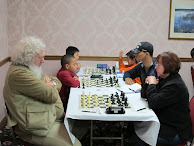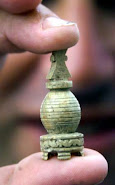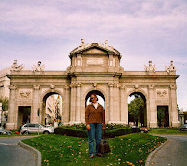From
The New York Times
The Egyptians call this harrassment, but it's second and sometimes third degree sexual assault and it's a disgusting commentary on the state of Muslim society. People who commit second and third degree sexual assault in the United States GO TO PRISON and are branded for life as SEXUAL PREDATORS. Why would any non-Egyptian woman EVER visit such a backward, filthy place? It seems the entire Middle East is hopelessly contaminated by the
macho (etymology is traced to the concept of "stupid goat man") ethic and the precepts of yet one more bogus patriarchal religion that teaches fear of females more than the Devil. Too bad the supporters of the Christian Taliban and the supporters of the Muslim Taliban can't meet at Armageddon and slug it out with their fists, the worthless
schmucks. Hopefully they would all kill each other and leave females in peace.
Harassers of Women in Cairo Now Face Wrath of Vigilantes
By
KAREEM FAHIM
Published: November 5, 2012
CAIRO — The young activists lingered on the streets around Tahrir Square, scrutinizing the crowds of holiday revelers. Suddenly, they charged, pushing people aside and chasing down a young man. As the captive thrashed to get away, the activists pounded his shoulders, flipped him around and spray-painted a message on his back: “I’m a harasser.”
Egypt’s streets have long been a perilous place for women, who are frequently heckled, grabbed, threatened and violated while the police look the other way. Now, during the country’s tumultuous transition from authoritarian rule, more and more groups are emerging to make protecting women — and shaming the do-nothing police — a cause.
“They’re now doing the undoable?” a police officer joked as he watched the vigilantes chase down the young man. The officer quickly went back to sipping his tea.
The attacks on women did not subside after the uprising. If anything, they became more visible as even the military was implicated in the assaults,
stripping female protesters, threatening others with violence and subjecting activists to
so-called virginity tests. During holidays, when Cairenes take to the streets to stroll and socialize, the attacks multiply.
But during the recent Id al-Adha holiday, some of the men were surprised to find they could no longer harass with impunity, a change brought about not just out of concern for women’s rights, but out of a frustration that the post-revolutionary government still, like the one before, was doing too little to protect its citizens.
At least three citizens groups patrolled busy sections of central Cairo during the holiday. The groups’ members, both men and women, shared the conviction that the authorities would not act against harassment unless the problem was forced into the public debate. They differed in their tactics: some activists criticized others for being too quick to resort to violence against suspects and encouraging vigilantism. One group leader compared the activists to the Guardian Angels in the United States.
“The harasser doesn’t see anyone who will hold him accountable,” said Omar Talaat, 16, who joined one of the patrols.
The years of President Hosni Mubarak’s rule were marked by official apathy, collusion in the assaults on women, or empty responses to the attacks, including police roundups of teenagers at Internet cafes for looking at pornography.
“The police did not take harassment seriously,” said Madiha el-Safty, a sociology professor at the American University in Cairo. “People didn’t file complaints. It was always underreported.”
Mr. Mubarak’s wife, Suzanne, who portrayed herself as a champion of women’s rights, pretended the problem hardly existed. As reports of harassment grew in 2008, she said, “Egyptian men always respect Egyptian women.”
Egypt’s new president, Mohamed Morsi, has presided over two holidays, and many activists say there is no sign that the government is paying closer attention to the problem. But the work by the citizens groups may be having an effect: Last week, after the Id al-Adha holiday, Mr. Morsi’s spokesman announced that the government had received more than 1,000 reports of harassment, and said that the president had directed the Interior Ministry to investigate them.
“Egypt’s revolution cannot tolerate these abuses,” the spokesman quoted Mr. Morsi as saying.
Azza Soliman, the director of the Center for Egyptian Women’s Legal Assistance, dismissed the president’s words as “weak.” During the holiday, she said, one of her sons was beaten on the subway after he tried to stop a man who was groping two foreign women. The police tried to stop him from filing a complaint. “The whole world is talking about harassment in our country,” Ms. Soliman said. “The Interior Ministry takes no action.”
For years, anti-harassment activists have worked to highlight the problems in Egypt, but the uprising seemed to give the effort more energy and urgency.
Over the holiday, the groups staked out different parts of Cairo’s downtown. One avoided any violence, forming human chains between women and their tormentors. The other group forcefully confronted men and boys it suspected of harassment, smacking around suspects before hauling them off to a police station.
One of that group’s founders, Sherine Badr el-Din, 30, started her work as an anti-harassment activist by asking men to get off the women-only cars on the Cairo subway, regarded as a safe zone. When they refused, she videotaped them and posted their pictures on the Internet, she said.
Last summer, one of the men attacked her. “I wanted to file a case, but the police officer refused, claiming they were only there to monitor the train schedules.” She said the group escalated its tactics out of frustration, after the police started releasing suspects the group had caught.
“Violence is not our method,” she said. “But the pressure was tremendous.”
Last week, as the group gathered near Tahrir Square, one member had what looked like a stun gun, and another shook a can of spray paint. Most participants were men, and some wore fluorescent green vests, with the words “combating harassment” written on the back.
They mused on the reasons for the frequency of the attacks on their sisters, mothers and friends, finding no sure answer in the blame often laid on poverty or religion, society’s indifference or the state’s contagious chauvinism.
They seemed more certain of the solution, as they plunged into the holiday crowds over several evenings. Some bystanders were supportive. But when violence broke out, there was less support. “I will tell the government on you,” one man screamed as the activists wrestled with a suspect.
Sometimes the patrol acted after seeing a woman being groped. At other times, it justified its attacks as preventive.
Two boys on a scooter hardly knew what hit them. One minute, they were driving along the Nile Corniche, saying something — maybe lewd, maybe not — to two girls strolling on the sidewalk. The next, they were being hauled off the scooter by the men in green vests. The melee that broke out afterward stopped traffic on one of downtown’s busiest roadways, before the police chased the patrol members off.
Afterward, Muhaab Selim, 23, a member of the group, could barely contain his anger. “Why do I have to wait until he touches them?” he yelled. “Why do people defend the harassers?”
By the end of the holidays, one of the group’s leaders, Muhammad Taimoor, 22, had been arrested after fighting with a suspect on the subway. Even so, he called the weekend a success. “We caught some harassers, sprayed them with paint and published their pictures everywhere,” Mr. Taimoor said. “The Interior Ministry wasn’t cooperating with us at all. They weren’t protecting women in the streets.”
While Mr. Taimoor and his colleagues were on patrol, another group, called Imprint, was in a nearby square. Nihal Saad Zaghloul, 27, an activist with the group, said its members stopped more than 30 men who were trying to harass women.
When the group believes someone is being harassed, some members form a wall between the attacker and the victim, while others take the woman to safety. “We don’t push back, and we don’t fight,” Ms. Zaghloul said. They ask police officers to be present, in case the woman wants to file a report.
Ms. Zaghloul, who became active after she and a friend were assaulted, was less critical of the patrol officers than some of the other activists. “They are understaffed, and at the same time, they are part of a society that always blames women, although they know it’s wrong.” She worried that the other group’s methods would alienate the public.
But she added, “No one understands their frustration better than me.”








































